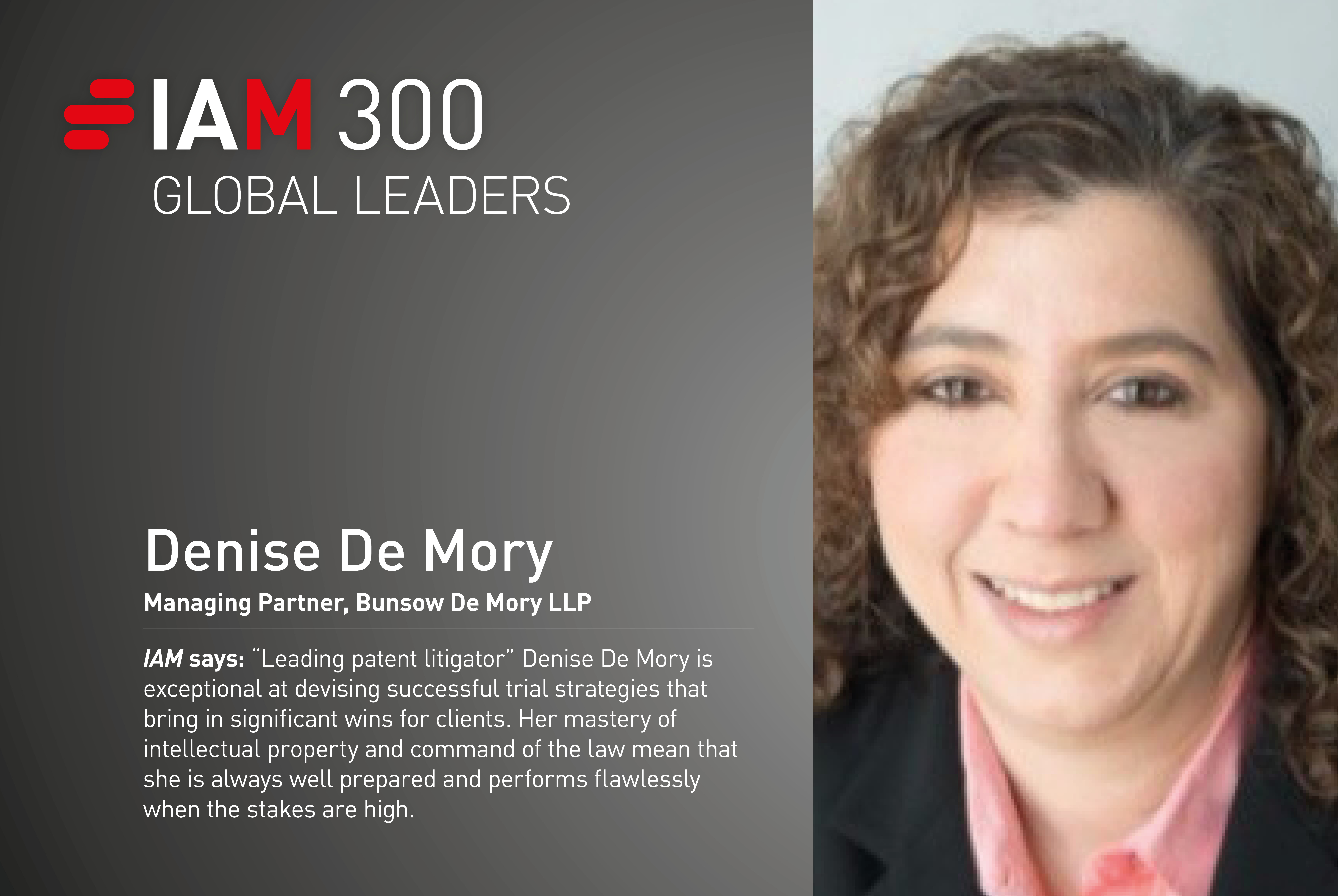Denise De Mory
How have client demands changed over the course of your career, and how has your practice adapted to this?
Over the years, client demands have changed dramatically in terms of receiving timely information, attorneys’ knowledge about technologies and value-added services. Instead of letters and face-to-face meetings, many clients now rely on digital communication. To adapt to this, my practice is to communicate with clients constantly using emails and video-conferencing to keep them informed and to get their input on our decision making. In today’s environment, clients are often involved with emerging technologies and have strong technical backgrounds, so they expect their attorneys to understand the these. We are well equipped to do this, as most attorneys on my team have in-depth knowledge of various technical fields. Clients are also more conscious about value-added service because of the increasing cost of patent litigation. We work with them to evaluate their intellectual portfolio and establish the most cost-efficient ways to realise the value of their technology, including alternative fee arrangements. That is one reason I shifted to plaintiff-side work, to help inventors and start-ups to protect their innovations.
Well over halfway through the Biden administration, how has its outlook on patents developed compared to previous administrations?
The prior administration encouraged district courts to consider granting injunctive relief in certain SEP-related cases. The Biden administration, much like the Obama administration, is far less receptive to this idea. I think the most notable difference is their policy stance on SEPs. This shift should benefit defendants in SEP-related cases, as plaintiffs will have one less form of relief and as a result, less negotiating leverage in settlement discussions.
Which of your cases are you most proud of and why?
I have litigated exceedingly complex cases for 30 years, including a patent trial that resulted in a $61 million verdict for my client. In a landmark case in my career, I was a member of the Department of Justice’s trial team in the United States v Microsoft antitrust litigation. I deposed executive-level Microsoft witnesses and the chief architect of Internet Explorer, offering one of the government’s technical experts at trial.
There is growing talk of applying arbitration to SEP/FRAND disputes. What are the advantages – and pitfalls – of using ADR to resolve such issues?
One benefit is that both sides get to select one of the three panel members. This assures that at least one member of the panel has the relevant expertise to understand the nuances of such cases. Other benefits include a faster and cheaper path to a resolution, as well as the ability to define the issues to be determined by the panel. Further, it may benefit the parties to agree to arbitrate narrow disputes ahead of litigation, such as whether the relevant technology is covered by SEP and/or what the FRAND rate should be. Confidentiality of arbitration awards could cut either way – patent owners may want to avoid setting a harmful precedent on invalidity, infringement or licensing rates if a determination does not go their way. An obvious downside to this is the inability to appeal or challenge an arbitration award, except on very narrow grounds.
You have won acclaim as a stellar patent litigator – can you tell us about some of the key skills that litigators need to succeed before the US courts?
First and foremost, you must like what you do and have a great team - I am fortunate to have both. Being a good communicator, having a strong understanding of the law, the ability to learn new technologies, strong leadership and written and oral communication skills are essential for success in this industry. Patent law is complicated and constantly changes. To succeed, a patent litigator has to understand the nuances of the law and its development and be willing to advocate for change to protect a client’s interests. Since patent cases often involve emerging technologies, the ability to learn about new innovation is important. Communication skills are crucial in liaising with team members, judges, juries, witnesses, clients and opposing counsel. It is my firm understanding of what is critical at trial and what it takes to effectively communicate with judges and juries that enables me to develop and pursue successful strategies and achieve my clients’ goals. Last but not least, litigating a case needs support from many people, so the ability to effectively build, create and combine the talents of a world-class team is essential.
Denise De Mory
Managing Partner
[email protected]
Denise De Mory is the managing partner and co-founder of Bunsow De Mory LLP and has litigated complex patent cases for 30 years. She has significant trial experience and was a key member of the Department of Justice’s landmark trial team in the United States v Microsoft antitrust litigation. Ms De Mory is one of very few women who manage a majority women-owned IP firm and she is recognised as an outstanding legal expert.
